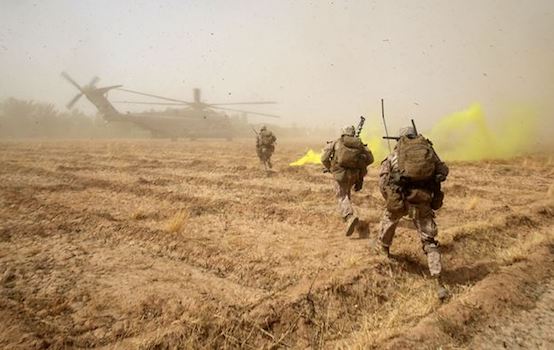A Chance to End America’s Longest War

The agreement signed in Doha today by the U.S. and the Taliban offers the prospect of finally ending a war that has dragged on for more than 18 years. That would be a very good thing for the U.S., and if it happens the Trump administration will deserve credit for it. The U.S. could withdraw without an agreement with the Taliban, and the war could have been ended on these terms long ago, but a late end is better than never ending the war. There is guaranteed to be a lot of pressure on the administration in Washington to renege on this agreement outright or to find some pretext for delaying the withdrawal, so it will be important for antiwar activists and advocates of restraint to counter that pressure as much as possible. This is a chance to end America’s longest war, and it must not be squandered.
There are several hitches that could prevent the agreement from being fully implemented. Adam Wunische from the Quincy Institute comments:
The Trump administration will likely seek to sell the U.S.–Taliban deal as both a peace accord and a U.S. military withdrawal. However, the deal President Donald Trump has struck only brings troop levels back to the level they were when he took office three years ago; that is, a reduction to 8,600 troops from the current levels of 13,000. A fuller withdrawal will only take place if the Taliban fully implements all elements of the deal, effectively giving the Taliban a veto on U.S. troop withdrawals. There are also indications that the U.S. intends to leave special forces troops in the country indefinitely for counterterrorism operations. Additionally, the numerous complications and barriers that remain to be overcome will provide ample ammunition for those arguing for a continued U.S. presence at current force levels. President Trump himself has indicated that the slightest unrest will provide justification for re-engagement. The requirement that the Taliban renounce al–Qaeda and prevent them from operating in their territory is a condition few actually expect the Taliban to follow through with. If this is not, in reality, a deal for a military withdrawal, it should be. The military has little left to offer in determining the outcome of the Afghan war.
As Wunische observes, Trump has promised troop withdrawals before in Syria only to reverse himself and come up with new excuses to keep some U.S. forces involved there. The challenge in getting to a full U.S. withdrawal is that the president is easily distracted and easily provoked, so any number of things could happen this year to derail the agreement. The Taliban will probably fail to fulfill some of their commitments, but if our government conditions our military presence on that we are setting ourselves up to never leave. We know that the Trump administration is quick to use even the slightest violation as an excuse to rubbish agreements, and we also know that they sometimes tear up deals even when they are working perfectly.
Wunische warns that withdrawal is tied to so many conditions that it probably won’t happen:
Trump has truly committed only to a withdrawal of forces to the troop strength when he took office, 8,600. And he has placed so many conditions on a full withdrawal that Afghanistan is quickly looking like a repeat of the late–2019 failure to withdraw from Syria.
The longer that U.S. forces remain in Afghanistan, the weaker our bargaining position becomes. Whatever follows U.S. withdrawal, it will not be made any better by delaying the withdrawal any further. If the withdrawal is completed, there is the additional danger that the U.S. will be tempted to intervene again at some point in the future. U.S. withdrawal from Afghanistan has to be total, and it also has to be permanent. We have seen in Iraq how easily the U.S. can fall into the trap of rushing back into a country where our forces shouldn’t be. When all U.S. forces leave Afghanistan, we need to make sure that they aren’t sent back again in just a few years.
To make this agreement stick, American political and military leaders have to reconcile themselves to the reality that there is nothing in Afghanistan that justifies a continued U.S. military presence. The U.S. has no vital interests there, so there is no reason to continue risking the lives of American soldiers and Marines there.
Comments